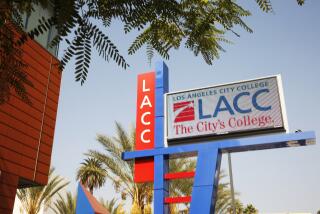A professor takes gifts of learning to a nation of strife
During the same summer that many Americans were divesting themselves of investments in South Africa, Edwin S. Munger was deepening his.
The Caltech professor plunged headlong into what is now his favorite project: raising funds for a little-known South African university that serves mostly black students in a country torn apart by racial strife.
Munger has just returned from Africa, where he has gone twice a year since 1961 to enhance his speciality, the geography and politics of countries south of the Sahara.
He also has become a champion of sorts for the University of the Western Cape, the only university near Capetown that serves the vast, underprivileged population of blacks and Coloreds (people of mixed race) and operates independently of the government.
Soliciting funds and support for a school that he describes as “on the cutting edge of change” during a social revolution is no easy task, Munger says.
But political and social upheaval in South Africa did not deter him from establishing the Cape of Good Hope Foundation two years ago and sending an estimated $75,000 in donated books to the school. He now has pledged to raise $100,000, a considerable sum in economically depressed South Africa.
“I don’t know where I’ll get it. I’ll just ask,” he said.
Raising money has become another speciality for Munger.
Before founding the Cape of Good Hope Foundation in 1984, he was president for 14 years of the L.S.B Leakey Foundation, which raised several million dollars to support the research in Africa of Mary Leakey, the late Louis Leakey and their son, Richard. The Leakeys headed the explorations in Africa that uncovered fossil skeletons of some of man’s earliest ancestors.
“The Good Hope Foundation doesn’t have that kind of appeal,” Munger said. “In a general sense, liberal people don’t want to have anything to do with South Africa. And in another sweeping generalization, people of a conservative nature aren’t interested in the black situation.
“We have a Colored saying: We are caught between the bark and the tree.”
In that in-between space, Munger said, “there are people who feel that no matter what scenario you might write, surely one of the things you need to do is educate some of the best black minds.”
And besides, he said, “there’s a line from Dante that says: ‘There’s a special place in hell for those who are neutral to crisis.’ I decided to do something positive.”
The University of the Western Cape was established in 1960 with 164 students; last year it had 7,700, about 500 of whom were white.
Most of the students are underprivileged, coming from families with little education and from preparatory schools inferior to those that whites attend.
“It was born without a soul, a bush college created by the ruling Establishment for a disenfranchised community who had no real say in its creation,” says one university publication, explaining student protests and demonstrations against South Africa’s apartheid government.
“UWC is liberating itself now and its role in the future may be one of showing other universities how to become really South African,” the pamphlet says.
“I get a lot of personal satisfaction from this,” said Munger, who admits to putting in many hours of frustrating fund raising that does not always produce results.
“I wouldn’t do this for one of the big white universities because I don’t think that’s the wave of the future. The University of the Western Cape is on the cutting edge of change.
“Here is a revolution that’s in progress, a major shift of power. We’re treading a very difficult line. How do you ride the tiger without ending up inside her?”
An energetic, gray-thatched 65-year-old man given to bellowing laughs, Munger is the founder of Caltech’s 32,000-volume Munger Africana Library. He said he is always seeking book donations for the University of the Western Cape because books are much more expensive in South Africa than in Southern California.
“Sure, we want scientific journals, but we want good fiction and we’ll take paperbacks. Those that don’t go in the library are put in the student dormitories. No book goes to waste,” he said.
“I evaluate those that are donated, l pack them and put them in canvas mail bags and send them to the university. And if anybody would like to help me carry them to the post office, they’re welcome to do so.”
More to Read
Sign up for Essential California
The most important California stories and recommendations in your inbox every morning.
You may occasionally receive promotional content from the Los Angeles Times.










